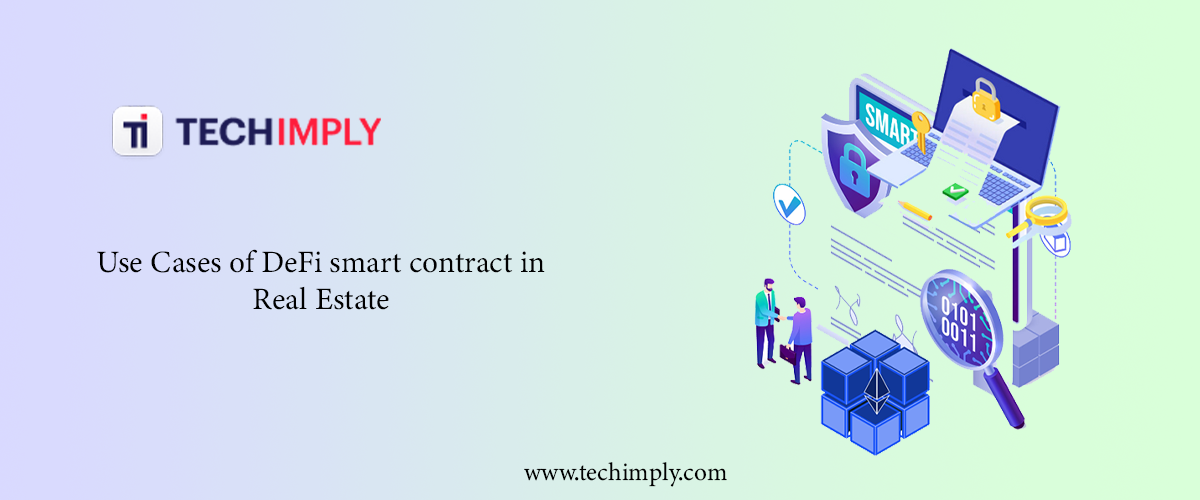DeFi smart contracts, an evolution of blockchain technology, are the latest buzzword in the property technology industry. It has become the solution of choice in the real estate industry, which seeks transparency and security for all parties involved in a legally binding agreement.
In addition, it eliminates the need for intermediaries in business contracts, thereby streamlining the contractual process.
How do DeFi smart contracts perform in real estate?
As the term implies, a DeFi smart contract in real estate is an electronic transaction protocol or digital program of a legal contract. This protocol encodes the terms and conditions of a legal agreement using an if/then algorithm in which one action triggers another.
Like encryption, the algorithm hashes the document's content to generate a unique key. The unique key serves as a mechanism for authentication that prevents tampering.
This essentially aids fraud prevention and provides additional functionality, such as automatic triggers. It enables the automatic release of funds, for instance, upon successfully adding the corresponding land registration. However, unless this condition is met, the protocol prohibits the payment transfer. State governments actively deploy DeFi smart contracts for various use cases, including land records and degree and caste certificates.
Benefits of DeFi smart contracts in Real Estate
-
Better Real Estate Liquidity
Real estate is notoriously illiquid for various reasons, including time-consuming transactions, higher transaction costs, longer hold periods, complex outreach, etc.
Incorporating DeFi smart contracts can significantly increase the liquidity of assets because the transaction process will not take months to complete, fractionalization will facilitate the trading mechanism, and the support will be globally accessible. Therefore, wagering on DeFi smart contracts is a wise decision. The continuous development of DeFi platforms provides a wide range of opportunities for investors and users to participate in the growing ecosystem.
-
More Secure
Due to the security features of this blockchain-based technology, most entrepreneurs are adopting it. The crowd control feature, which has been previously discussed, includes both decentralization and data encryption, thereby enhancing security. This reduces the possibility of fraud and is safer than formal legal contracts.
This does not, however, imply that your DeFi smart contract is completely immune to cybercrimes like hacking. You can rest assured that no cybercrime will occur if you hire an experienced IT professional who can perform security audits, vulnerability scanners, and penetration tests, among others.
-
Transparency
Transparency is one of Blockchain's chief advantages. It is protected by the combination of data immutability (it cannot be altered after its creation), visibility (every action taken is visible to all participants), and crowd control (a copy of the Blockchain is stored on each computer of the relevant network).
Therefore, the history of all transactions is accessible to all network participants. It is impossible to conceal the ownership history or modifications made to an asset.
-
Higher transaction speed
Real estate transactions are notoriously time-consuming. The completion of a transaction may take weeks, months, or even years. A simple real estate DeFi smart contract Development can eliminate the inconvenience. Red tape and sluggishness are replaced by precise and well-considered computerization. The transaction is carried out automatically, streamlining the process for prospective investors and property owners.
Here Are The Use Cases Of DeFi smart contracts In Real Estate.
DeFi smart contracts provide a dependable method for conducting real estate transactions that require trust, transparency, and anonymity between parties.
Here are the real estate use cases for DeFi smart contracts.
1. Identity Management
We must remain protected from the devastating effects of identity fraud, such as unauthorized access to our bank accounts, emails, etc.
Many existing technologies can prevent such crimes, but they should be more effective because many do not give the owner complete control over his data and the information he chooses to disclose.
Defi smart contracts for Digital Identifiers (DIDs) are based on decentralized, distributed ledger technologies. They provide individuals with complete control over their data and the ability to share it as they see fit, thereby enhancing data security and decreasing the likelihood of data mismanagement or breach.
2. Property Ownership Transfer
Conventional real estate contracts are becoming obsolete for several reasons; they are intended to define mutual terms of agreements, which can be ambiguous and interpreted from various perspectives. This is why parties spend so much time and money arguing about contractual terms.
Defi smart contracts reduce the overall imprecision of these standard contracts.
Due to the ambiguity of traditional contracts, the transfer of property ownership in real estate transactions could be more relaxed and safe for both parties.
The seller is frequently hesitant to transfer ownership before receiving payment, and the purchaser is similarly reluctant to transfer funds before acquiring the property. Notaries alleviate the issue to a certain extent, increase the costs of transferring property ownership, and cause delays.
DeFi smart contracts solve these issues and accelerate the transfer of property ownership. Contracts for the transfer of property ownership are automatically executed when the requisite conditions are met.
3. Hassle-free Lease Agreements For Rentals
With the assistance of DeFi smart contracts, it is easier to rent out properties. For instance, Rent Peacefully is a platform that uses DeFi smart contracts to enable the listing and Rent of properties on the Blockchain.
A tenant benefit of Rent Peacefully is that when a maintenance request is submitted to the Blockchain, the DeFi smart contract locks the Rent until the problem is resolved.
4. Real Estate Investing
Blockchain introduces an entirely new level of complexity to real estate investing. Suppose, for instance, that you are aware that the government is investing heavily in the urban development of a particular city neighborhood. This will result in an increase in property prices over the next few years. You can now profit from the rise in property value.
Tokenized fractional ownership is a blockchain-based investment alternative. It enables investors to buy and sell tokens rapidly and trade fractions of their tokenized ownership instead of the entire ownership.
You can program DeFi smart contracts for such real estate transactions to generate rental income or dividends for the holder.
Conclusion
In the real estate industry, intelligent contracts were introduced many years ago. It has become a potent and valuable tool that has accelerated tedious manual document verification and processes. It has numerous benefits, including greater communication and transaction time transparency, lower transaction costs, and increased security.




.jpg)

